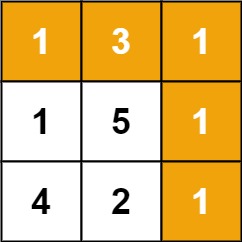LeetCode-in-All
64. Minimum Path Sum
Medium
Given a m x n grid filled with non-negative numbers, find a path from top left to bottom right, which minimizes the sum of all numbers along its path.
Note: You can only move either down or right at any point in time.
Example 1:

Input: grid = [[1,3,1],[1,5,1],[4,2,1]]
Output: 7
Explanation: Because the path 1 → 3 → 1 → 1 → 1 minimizes the sum.
Example 2:
Input: grid = [[1,2,3],[4,5,6]]
Output: 12
Constraints:
m == grid.lengthn == grid[i].length1 <= m, n <= 2000 <= grid[i][j] <= 100
Solution
#include <stdio.h>
#include <stdlib.h>
#include <limits.h>
int recur(int** grid, int** dm, int r, int c, int rows, int cols) {
if (dm[r][c] == 0 && r != rows - 1 && c != cols - 1) {
dm[r][c] = grid[r][c] + (recur(grid, dm, r + 1, c, rows, cols) < recur(grid, dm, r, c + 1, rows, cols)
? recur(grid, dm, r + 1, c, rows, cols)
: recur(grid, dm, r, c + 1, rows, cols));
}
return dm[r][c];
}
int minPathSum(int** grid, int gridSize, int* gridColSize) {
if (gridSize == 1 && gridColSize[0] == 1) {
return grid[0][0];
}
int rows = gridSize;
int cols = gridColSize[0];
int** dm = (int**)malloc(rows * sizeof(int*));
for (int i = 0; i < rows; i++) {
dm[i] = (int*)malloc(cols * sizeof(int));
for (int j = 0; j < cols; j++) {
dm[i][j] = 0; // Initialize to 0
}
}
int s = 0;
for (int r = rows - 1; r >= 0; r--) {
dm[r][cols - 1] = grid[r][cols - 1] + s;
s += grid[r][cols - 1];
}
s = 0;
for (int c = cols - 1; c >= 0; c--) {
dm[rows - 1][c] = grid[rows - 1][c] + s;
s += grid[rows - 1][c];
}
int result = recur(grid, dm, 0, 0, rows, cols);
// Free allocated memory
for (int i = 0; i < rows; i++) {
free(dm[i]);
}
free(dm);
return result;
}

